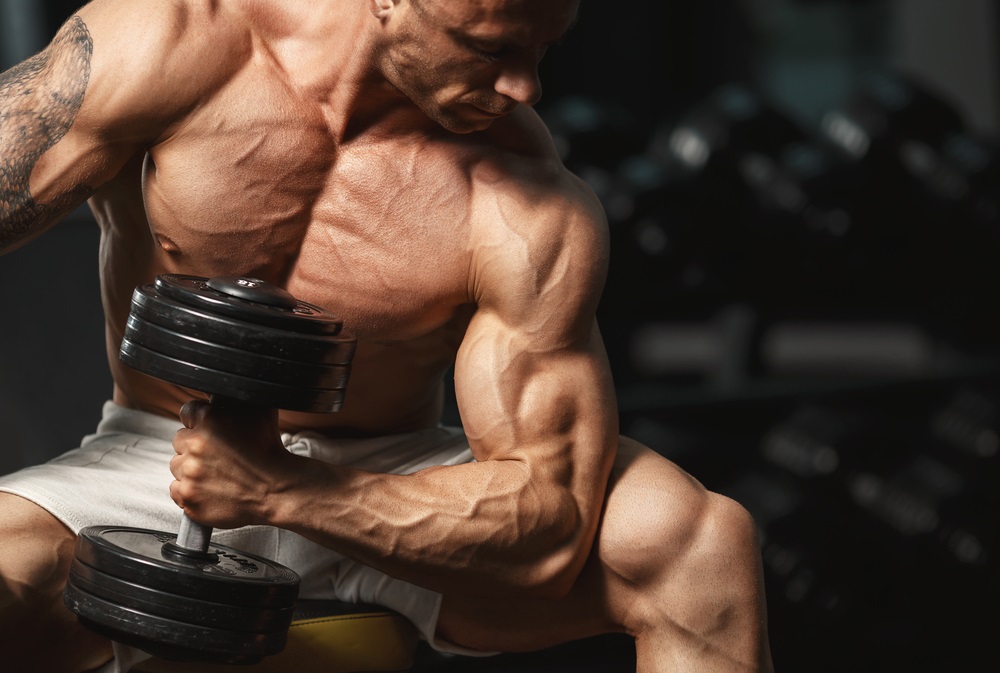
Testosterone is a hormone predominantly found in men and produced in the testicles.
Your testosterone levels play a crucial role in muscle and bone health, sexual drive, sperm production, and overall vitality. Testosterone levels naturally decline as men age, leading to noticeable physical and emotional changes.
When testosterone starts to drop, it’s easy to feel the negative side effects and not feel like yourself. Read on to find out about what causes testosterone levels to drop, testing for low testosterone levels, plus treatments that can help boost your testosterone levels.
In your 20s and 30s, you might not notice a decrease in testosterone levels, as your body typically produces it in abundance during these years. However, starting around the age of 30, testosterone levels begin to decline at a steady rate of approximately 1% per year.
Symptoms of low testosterone levels typically become noticeable around the age of 40, and research indicates that low testosterone is found in 20% of men over 60 years.
Men with low testosterone often notice decreased energy, stamina, and sexual performance. Although the signs and symptoms of low testosterone levels can vary, the most common include the following:
• Reduced lean body mass
• Increased abdominal fat
• Decreased libido and erectile dysfunction
• Loss of body hair
• Reduced energy and physical strength.

In bodybuilding, men often seek ways to enhance muscle growth and performance. One of the key ways to do this is with anabolic steroids. Testosterone replacement therapy is another option, but how effective is it compared to anabolic steroids? Let’s take a look.
Prescribed by healthcare professionals, TRT aims to alleviate symptoms of low testosterone, such as reduced muscle mass, fatigue, and decreased libido. While testosterone replacement therapy for muscle gain is not recommended, it can contribute to improved muscle growth and overall vitality. Testosterone therapy typically involves regular monitoring to ensure safety and effectiveness, minimising the risk of adverse effects.
Anabolic steroids are a popular yet controversial method, as they artificially increase testosterone levels to accelerate muscle gains and improve physical performance. Anabolic steroid use often involves significantly higher doses, leading to rapid increases in muscle mass and strength. However, the serious health risks associated with steroid use make testosterone treatments a safer and more sustainable approach.
Dangers of Anabolic Steroids
Anabolic steroids can lead to numerous severe health complications, including:
• Cardiovascular Issues: Increased risk of heart attacks, high blood pressure, and strokes
• Liver Damage: Elevated risk of liver cancer and liver failure
• Hormonal Disruption: Suppression of natural hormone production, leading to long-term imbalances, which may cause testicles to shrink.
• Gynecomastia: Development of breast tissue in men.
• Mood Disorders: Increased aggression, irritability, and potential for depression.
• Dependence: Risk of developing a psychological dependence on steroids.
TRT is a controlled, medically supervised treatment with a focus on restoring hormonal balance, while anabolic steroids are often used without medical guidance, posing significant health risks. Unlike steroids, the long-term effects of TRT are well researched and widely understood. Current evidence suggests that testosterone replacement therapy (TRT) is safe for most men. However, there is a slightly higher risk of adverse events in men with multiple medical conditions or those considered high-risk.
Because TRT involves a blood test for low testosterone levels and regular medical monitoring to ensure safety and efficacy, this reduces the likelihood of any severe side effects. Anabolic steroid users typically lack such oversight, increasing the potential for dangerous outcomes.
No matter what your age, a healthy diet and lifestyle will do wonders for your overall health. You might not notice the drop in testosterone until your forties, but until then, there are many ways to maintain your testosterone levels so you have fewer problems later.
Preventative measures go a long way towards combating all manner of health conditions. Together, the lifestyle adjustments listed below can help boost testosterone levels and overall well-being.
Research consistently shows that men who exercise regularly have higher testosterone levels than those who lead a sedentary lifestyle. There’s no better time than now to incorporate an exercise routine into your daily life, with a special focus on weight training.
Small, consistent efforts to improve your fitness can lead to substantial benefits for your testosterone levels and overall physical and mental health. Start with manageable goals and gradually increase the intensity and frequency of your workouts. Building and maintaining muscle not only helps you maintain weight, keep body fat down, and protect you from bone loss, but it can also increase testosterone levels.
Finding the motivation to exercise can be challenging, especially if you’re in a slump. If you’re new to weight training, consider working with a personal trainer to develop a tailored plan and learn proper techniques.
Maintaining a healthy weight or losing excess weight can significantly boost testosterone levels. Research into testosterone levels indicates that men who manage their weight effectively or lose weight if they are obese tend to have higher testosterone levels. If your diet consists largely of convenience foods or frequent take-outs, it might be time for a dietary overhaul.
What constitutes a “healthy” diet can vary, but the essentials are widely recognised. Prioritise vegetables like greens and mushrooms, and high-fibre foods such as oats and black beans, which are excellent for heart health. Avoid trans fats and overly sugary or processed foods, and instead, enjoy omega-rich “good” fats found in Brazil nuts and walnuts.
Incorporate zinc-rich foods such as oysters and other seafood into your diet, as zinc is crucial for testosterone production. Selenium is another important nutrient, with Brazil nuts being a potent source. However, consume Brazil nuts in moderation to avoid selenium toxicity.
Stress is an inevitable aspect of modern life and can significantly harm your body, particularly your hormone levels. Chronic stress leads to elevated cortisol, which in turn can cause erratic changes in testosterone. Managing stress effectively is crucial for maintaining hormonal balance and overall health.
Ways to Reduce Stress
Incorporating these stress reduction techniques into your daily routine can lower cortisol levels and help maintain healthy testosterone levels, leading to a more balanced and healthier life.
Maintaining a healthy sleep schedule is crucial for hormone balance and testosterone levels. Burning the candles at both ends is unsustainable; failing to get sufficient sleep not only impairs cognitive abilities but also compromises immunity, sex drive, and testosterone production.
Inadequate sleep patterns can significantly lower testosterone levels, potentially by up to 15%. This reduction can have adverse effects on your body and overall health. By making sleep a priority and implementing healthy sleep habits, you can support your body’s natural processes, including hormone regulation, and enhance your overall quality of life.
Increasing your vitamin D intake through sunlight exposure, dietary changes or supplements is an effective and natural way to enhance testosterone levels without drastic lifestyle changes.
Research demonstrates a positive correlation between vitamin D levels and testosterone production. Randomised controlled trials indicate that maintaining adequate vitamin D levels supports total and free testosterone levels.
It’s crucial because low vitamin D levels are often linked to testosterone deficiency, particularly in regions with limited sunlight like the UK. Aside from sunlight and supplements, vitamin D can be sourced from fortified foods, such as breakfast cereals.
| Fish | Meat | Fruit and Vegetables | Other Sources |
| Rainbow trout, | Beef | Oranges | Egg yolks |
| Salmon | Liver | Apple | Brown rice |
| Tuna | Chicken | Banana | Almonds and Almond milk |
| Herring | Carrots | Whole wheat bread | |
| Sardines | Mushrooms | Lentils | |
| Tilapia | Broccoli | Sunflower seeds | |
| Flounder | Edamame |
Zinc is another critical nutrient essential for testosterone synthesis. Studies have shown that a deficiency in zinc correlates with lower testosterone levels. Including zinc-rich foods like oysters and other seafood in your diet or taking zinc supplements supports testosterone production and overall hormonal balance.

If healthy lifestyle changes aren’t doing enough to get your testosterone to a healthy level, we have many treatment options that have a great success rate. If you notice you are feeling foggy or lethargic and are not in the mood for sexual activity, it’s a good idea to get your hormone levels checked.
These are all signs that you may have low testosterone. There are several ways you can increase your testosterone with our help. We treat your concerns with respect, and we take the issues extremely seriously. We do a comprehensive consultation with a physical examination and a comprehensive TRT screening to find out what your current testosterone levels are.
Testosterone treatments come in various forms, including injections, gels, patches, oral tablets, and pellets implanted under the skin. At Harley Street MD, the most popular testosterone treatment we provide is Nebido (testosterone undecanoate). The Nebido injection can help increase muscle mass, help the body burn fat quicker, improve sex drive and improve the longevity of erections. The treatment is given as an injection, the procedure takes very little time and is relatively pain-free with minimal recovery time needed.
Some men choose to have oral testosterone therapy or transdermal hormone therapy in the form of a gel that is applied to the skin. Once you’ve received your TRT screening, our experts can advise the appropriate treatment for you, and you can read more information here.
At our CQC registered clinic, our men’s health experts are here to help you improve the symptoms you’re experiencing from having low testosterone. We know that this can affect your sex life, your work life, your hobbies, physicality and even your mental health – so we know how important this issue is, no matter what your age.
Low testosterone is diagnosed through a combination of a physical examination, assessment of symptoms, and blood tests to measure testosterone levels. A healthcare provider will determine if levels are below the normal range and discuss appropriate treatment options.
Men over the age of 40 are at increased risk for low testosterone. Other risk factors include obesity, chronic illnesses (such as diabetes and liver disease), use of certain medications (like opioids and steroids), and testicular injuries or infections.
The time it takes to see improvements with testosterone treatments varies. Some men may notice changes within a few weeks, while for others, it might take several months. Factors such as the type of treatment and individual response play a role in the timeline.
Yes, while many men experience positive changes with testosterone treatments, such as increased energy, improved mood, and enhanced muscle mass, there can be side effects. Potential side effects include acne, sleep apnea, increased red blood cell count, and breast enlargement. It’s crucial to have regular medical supervision to monitor and manage any adverse effects.
Over-the-counter testosterone boosters are not regulated and may not be safe or effective. It’s important to consult a healthcare professional before using any supplements, as they can interact with other medications and may have unintended side effects.
The research and study references we used, in addition to our internal research, are all referenced here; most of them have an external link to the scientific publication. We work hard to bring you the most recent, impartial, factual, and evidence-based information to help you make informed decisions.
• Stanworth RD, Jones TH. Testosterone for the ageing male; current evidence and recommended practice. Clin Interv Aging. 2008;3(1):25-44. doi: 10.2147/cia.s190. PMID: 18488876; PMCID: PMC2544367. From: NIH
• The ‘male menopause’. From: NHS
• Morales A, Bebb RA, Manjoo P, Assimakopoulos P, Axler J, Collier C, Elliott S, Goldenberg L, Gottesman I, Grober ED, Guyatt GH, Holmes DT, Lee JC; Canadian Men’s Health Foundation Multidisciplinary Guidelines Task Force on Testosterone Deficiency. Diagnosis and management of testosterone deficiency syndrome in men: clinical practice guideline. CMAJ. 2015 Dec 8;187(18):1369-1377. doi: 10.1503/cmaj.150033. Epub 2015 October 26. PMID: 26504097; PMCID: PMC4674408. From: NIH
• NIDA. 2024, March 21. Anabolic Steroids and Other Appearance and Performance Enhancing Drugs (APEDs). Retrieved from https://nida.nih.gov/research-topics/anabolic-steroids in 2024, June 27. From: NIH
• Grech A, Breck J, Heidelbaugh J. Adverse effects of testosterone replacement therapy: an update on the evidence and controversy. Ther Adv Drug Saf. 2014 Oct;5(5):190-200. doi: 10.1177/2042098614548680. PMID: 25360240; PMCID: PMC4212439. From: NIH
• Vaamonde D, Da Silva-Grigoletto ME, García-Manso JM, Barrera N, Vaamonde-Lemos R. Physically active men show better semen parameters and hormone values than sedentary men. Eur J Appl Physiol. 2012 Sep;112(9):3267-73. doi: 10.1007/s00421-011-2304-6. Epub 2012 January 11. PMID: 22234399. From: NIH
• Kraemer WJ, Ratamess NA. Hormonal responses and adaptations to resistance exercise and training. Sports Med. 2005;35(4):339-61. doi: 10.2165/00007256-200535040-00004. PMID: 15831061. From: NIH
• Eriksson J, Haring R, Grarup N, Vandenput L, Wallaschofski H, Lorentzen E, Hansen T, Mellström D, Pedersen O, Nauck M, Lorentzon M, Nystrup Husemoen LL, Völzke H, Karlsson M, Baumeister SE, Linneberg A, Ohlsson C. Causal relationship between obesity and serum testosterone status in men: A bi-directional mendelian randomization analysis. PLoS One. 2017 Apr 27;12(4):e0176277. doi: 10.1371/journal.pone.0176277. PMID: 28448539; PMCID: PMC5407807. From: NIH
• What Is Low Testosterone? Symptoms, Causes, Diagnosis, Treatment, and Prevention. From: EVERYDAY HEALTH
• Silvani MI, Werder R, Perret C. The influence of blue light on sleep, performance and wellbeing in young adults: A systematic review. Front Physiol. 2022 August 16;13:943108. doi: 10.3389/fphys.2022.943108. PMID: 36051910; PMCID: PMC9424753. From: NIH
• Monson NR, Klair N, Patel U, Saxena A, Patel D, Ayesha IE, Nath TS. Association Between Vitamin D Deficiency and Testosterone Levels in Adult Males: A Systematic Review. Cureus. 2023 Sep 24;15(9):e45856. doi: 10.7759/cureus.45856. PMID: 37750061; PMCID: PMC10518189. From: NIH
• Te L, Liu J, Ma J, Wang S. Correlation between serum zinc and testosterone: A systematic review. J Trace Elem Med Biol. 2023 Mar;76:127124. doi: 10.1016/j.jtemb.2022.127124. Epub 2022 Dec 23. PMID: 36577241. From: NIH
• Vitamin D. From: NHS
• Vitamin D Fact Sheet for Health Professionals. From NIH
• Current Dietary Guidelines. From: DGA.